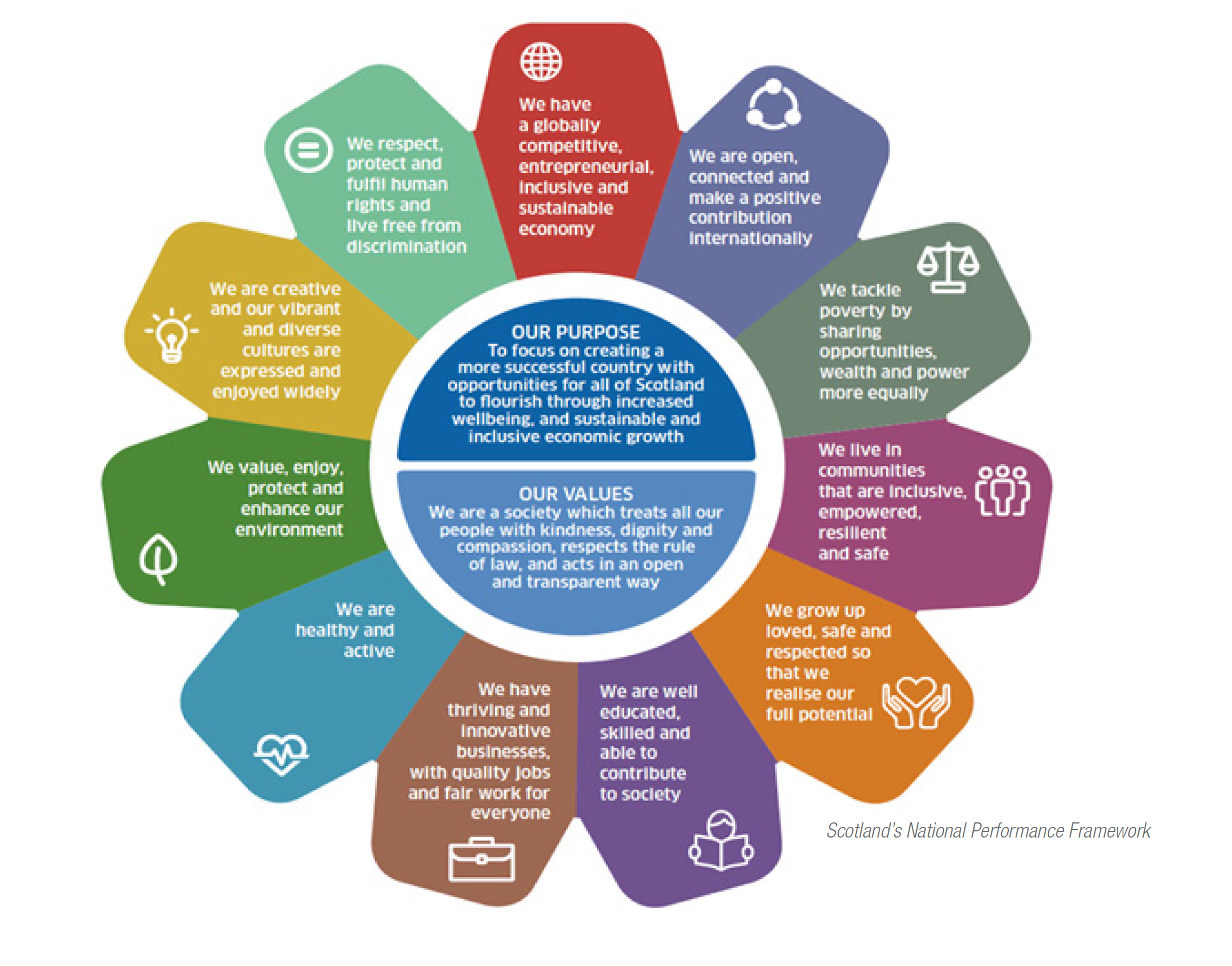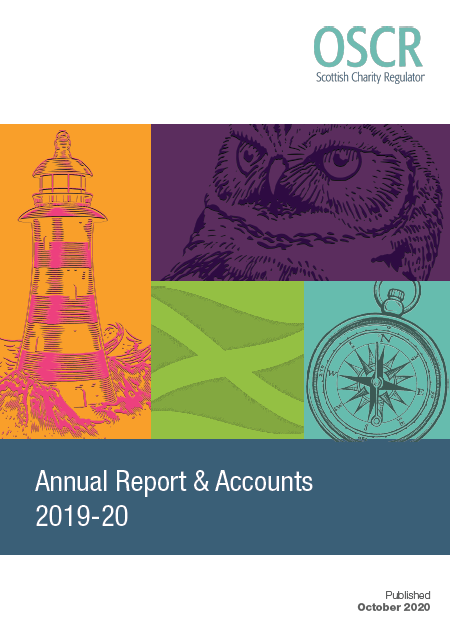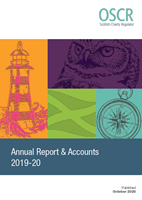OSCR Annual Review 2019-20
This webpage is a summary of some key pieces of work from 1 April 2019 to 31 March 2020, and draws on information from our Annual Report and Accounts.
Introduction from
the Chair
I am delighted to share our Annual Report and Accounts for 2019-20, having now completed my first full year as Chair of OSCR.
During that time the organisation has worked extremely hard to not only develop a strong corporate vision for the future, as articulated in our new Corporate Plan, but to begin to implement it. My fellow Board Members and I have been privileged to have been a part of that process and look forward to supporting the staff team over the coming year, as our transformation journey continues. There is no doubt that this is a critical time for charities and the wider third sector, as their essential contribution to Scottish society is more relevant and important than ever. To properly fulfill that role, public trust and confidence in charities needs to be high, and there is strong evidence that increasing public awareness of charity regulation increases the level of trust and confidence in it. We will work with the sector and partners to help charities have the skills, understanding and knowledge they require to be the best organisations they can be.
The Board and I have a strong ambition for OSCR to be a robust and enabling regulator and champion of the sector, and 2019-20 marked the start of delivery of that ambition. This Report outlines some of the achievements and challenges we have faced throughout the last twelve months as we started to re-align our systems and processes, further develop our governance arrangements, establish better partnership working with key stakeholders, and articulate the strategies and approaches which will be essential to future success. I am confident that our work to date has provided a strong foundation for the challenges ahead, and that OSCR is going into 2020-21 strongly placed to deliver our vision for a trusted and respected Scottish charity sector which positively contributes to society.
I wish to thank the Members of the OSCR Board for their contributions throughout the year, and also our hugely committed staff, ably led by our Chief Executive Maureen Mallon.

Lindsay Montgomery CBE
OSCR Board Chair
Purpose and activities of the organisation
OSCR is the independent regulator and registrar for Scotland’s 25,000+ charities.
We grant charitable status, monitor registered charities, and identify and take action where we believe misconduct including mismanagement has occurred. We are a non-ministerial office (NMO) of the Scottish Administration, operating independently of the Scottish Government, reporting directly to the Scottish Parliament. The Members of OSCR which comprise its Board are appointed by Scottish Minsters through the public appointments process. The staff of OSCR are Scottish Government civil servants, but report and are accountable to the Board of OSCR.
All charities in Scotland must be registered with us and must meet annual reporting requirements to keep their status. We are an enabling regulator and offer a wide range of services to support and encourage improvement within the charity sector.
Our work with charities ultimately supports public confidence in the sector. We support and champion Scottish charities through a collaborative approach, working with other organisations, government and the charity sector itself to share good practice and improvements and drive up standards in charities.
We use our knowledge and intelligence to positively influence and inform the development of national policy, legislation and practice; and are committed to delivering good quality services to the charity sector; and to improving the lives, wellbeing and safety of the communities and environment where we work and live.
Financial Statement
| Operating costs | 18/19 | 19/20 |
| Staff costs | 2,115,000 | 2,288,000 |
| Other administration costs | 815,000 | 1,003,000 |
| Depreciation and amortisation | 10,000 | 3,000 |
| Net operating cost | 2,940,000 | 3,294,000 |
A word from the Chief Executive
How different the world is from twelve months ago, when as OSCR’s new Chief Executive, I presented my first Annual Report. Recent months have been a time of unprecedented and unpredictable challenge for us all with the COVID-19 pandemic affecting every walk of life.
In a matter of weeks, OSCR has changed radically in ways which would have been previously unimaginable, as the office-based processes and systems which we operated have been adapted to different way of working.
What has not changed is our commitment to supporting charities in Scotland, and our belief that Scotland is a stronger, more aspirational and ethical country as a result of the quality and scale of its 25,000 charities +.
OSCR is an organisation which has developed and evolved in the years since it was established, adapting to the changing needs of the sector and overall operating environment and, most importantly, staying relevant.
Reading through this Report, I was reminded of how much that has been true over the past twelve months, as we have developed new strategies and working approaches; and worked to influence policy colleagues, elected officials and other organisations, to help ensure that the role, impact and potential of the charity sector is more widely recognised and understood by the public and partners.
Our achievements throughout 2019-20 stand us in very good stead for the future, and all its unknowns and uncertainties, and would not have been possible without such an engaged, enthusiastic, knowledgeable and resilient staff team. Throughout the year I have continued to be astounded by their passion and commitment to both OSCR and to proportionate yet robust charity regulation.
I am confident that as we go into 2020-21 OSCR is well placed to not only deliver our ambitious targets, but also to meet the challenges which will undoubtedly emerge for both ourselves as an organisation, and the charity sector itself as the impact and legacy of the COVID pandemic emerges. I look forward to reporting back on our successes in twelve months.
Maureen Mallon, OSCR Chief Executive
A summary of key performance trend information for 2019-20
There was a continued increase in the number of status applications during 2019-20, and the overall number of registered Scottish charities increased from 24,536 in 2018-19 to 24,882. The time we took to process applications from receipt to approval increased from 69 to 94 days, and the overall percentage concluded within our internal 90-day target fell to 56%, from 76% in the preceding year.
Changes to our internal processes, staff vacancies at the start of the year and the increasing complexity of applications accounted for our performance dip. As our risk based approach becomes embedded, and our organisational redesign is implemented, we anticipate that our considerations will become increasingly streamlined.
We operate to statutory timescales for considering consent to change applications received from charities, and in 2019-20, all applications were considered on time.
Timescales for the consideration of applications from charities to re-organise are also in place, and during the year were met in respect of 98% of applications, which was a decrease of 1% on the previous year.
The number of concerns about charities we received increased from 506 to 620 during the year. Following initial assessment, we determined that it was appropriate for us to act in only 127 cases, which was consistent with the previous year. In February we published updated guidance, How OSCR deals with concerns and inquiries, with a view to providing clarity and managing expectations of individuals who raise concerns with us. We ended the year with a significantly higher number of open inquiries than in 2018-19, and whilst we aim to conclude as many as we can within 9 months of receipt, this is not always possible since we are often reliant on the provision of information from external sources.
As Scotland’s charity regulator, we must report on the subject of the inquiries we make when as a result of our inquiries we:
- give a direction, or remove a charity from the Register
- suspend a person from acting as a charity trustee, or
- issue a direction to a charity in respect of a specific action or actions.
We also publish Inquiry Reports where we believe that our findings offer useful lessons for the wider sector, and during the year, 5 Inquiry reports were prepared and published on our website.
Engaging with stakeholders is a critical part of our work, and whilst our website is our most widely used delivery channel, we have increased our Twitter and Facebook presence to deliver key messages and provide general and specific information and guidance. Website visitor numbers increased during the year, with our Register, and guidance sections receiving the most visits. Short guidance videos are regularly uploaded, and our Blog provides comment and analysis from a number of external speakers.
We continued our programme of meetings through our Meet the Regulator Events and also presented at a number of externally hosted ones. For those stakeholders who wish to access more traditional updates, six issues of our Newsletter, OSCR Reporter were published.
Security and cyber resilience are critical to the effective delivery of digital services, and in 2019-20 we secured Cyber Essential Plus accreditation for a second year. Securing accreditation demonstrates that OSCR has appropriate technical security systems in place and provides assurance and reassurance to our online service users. We have promoted the importance of cyber security and resilience to stakeholder, through website articles and discussion at events, including highlighting the availability of SCVO grants for the third sector.
In 2019-20 we received 15 formal complaints about our procedures or service standards, which was an increase of 3 on the 2018-19 level. All complaints are analysed to determine potential service improvements or areas of development, and our Inquiry policy was revised during the year, to take cognisance of complaints received.
As a public body our activities fall within the scope of the Freedom of Information (Scotland) Act 2005, and we received 44 requests for information during the year, which was an increase from the 39 requests received in 2018-19. 99% of requests were responded to within the statutory timescale.
Scotland's National Performance Framework
The National Performance Framework (NPF) is for all of Scotland, and sets out the how the government’s ambitions for the following will be achieved.
- create a more successful country
- give opportunities to all people living in Scotland
- increase the wellbeing of people living in Scotland
- create sustainable and inclusive growth
- reduce inequalities and give equal importance to economic, environmental and social progress.
We believe that charities are essential to the implementation of the National Performance Framework (NPF) and have identified the five NPF indicators where we as an organisation can contribute; and where Scotland’s charities will play a significant role in delivery.
- Globally competitive, entrepreneurial, inclusive and sustainable economy
- Open, connected and make a positive contribution internationally
- We live in communities that are inclusive, empowered, resilient and safe
- We are well educated, skilled and contribute to society
- We have thriving and innovative businesses with quality jobs and fair work for everyone.


Legislative change
Following the Scottish Government consultation on proposed changes to Scottish charity law, a full analysis of responses was published in July 2019. The responses showed a high level of support for the 10 consultation proposals, and whilst some respondents called for a wider review of charity law, others identified further technical changes to the 2005 Act for consideration.
Scottish Government determined that the proposals required further development and targeted engagement, and throughout 2019-20 we worked closely with Scottish Government officials to provide evidence and information to inform this development.
Ministers did, however commit to amending the Scottish Charitable Incorporated Organisation (Removal from Register and Dissolution) Regulations 2011, and in August 2019 the SCIO Dissolution Working Group 2019 was set up to make recommendations to Scottish Government about improving the SCIO Dissolution Regulations 2011. OSCR acted as group secretariat, and supported members as they worked towards production of the final report on the 10 March 2020.
Having been aware of a number of areas where the Scottish legislation lagged behind other parts of the UK, for several years, the delays in legislative change have been disappointing. We remain committed to working with government colleagues to promote and support the development of change proposals over the coming year, albeit that we recognise that amidst the competing legislative requirements stemming from global and national events, charity law reform may be regarded as less of a priority for government than for is.
Developing a digital strategy, and updating systems and technology
OSCR online, the system which we use to regulate charities, and which generates the Scottish Charity Register is reaching the end of its life and is not capable of meeting our changing business requirements, or the digital aspirations of users. Having identified a requirement to replace it with an agile solution which supports efficient working and an improved user experience, a key challenge was to establish how to progress with a critical system update,
given the options available in the market, and our lack of in-house technical development skills. With our Board’s support, we engaged colleagues from the Scottish Government’s Digital Transformation Service, who worked with us to develop an overarching Digital Strategy that articulated our corporate aspirations in respect of using technology to support our operational delivery activities now and in the future. The Strategy was published in October 2019, and supported by user research an implementation plan for key elements of our digital transformation, was developed. Our Board are extremely committed to digital delivery, appreciating the operational and financial efficiencies and enhanced user experiences that can result, and will play, a key oversight role as we move towards procuring a replacement Online system and cloud hosting solution, around June 2020. In the coming year, most of our new investment will be related to technical transformation and resources will be targeted towards facilitating delivery of the Online replacement system.
New ways of working and resourcing
At the beginning of April 2019, we began a pilot work programme focussed on a more risk-based approach to aspects of our casework activity. This involved the introduction of a single corporate triage team, who initially assessed Notifiable Events and Consent applications, before progressing on to Status applications.
The triage work is conducted by the newly created Risk Assessment Team, which comprises staff members from all parts of the organisation, who for a short-term period undertake what is in effect an internal secondment to carry out this work.
The risk assessment work has been monitored and evaluated at regular intervals, and feedback has been positive in terms of consistency and quality of decision making, and volumes of cases considered. This leads us to believe that more flexible working is the way we would wish to progress in future, albeit that there are a number of changes which we will have to fully consider and decide upon to enable us to do so. Foremost amongst these are changes to how we measure and report on our performance; and also, the staff resources and organisational structure required to support more effective and agile corporate working. In November, our Board agreed that an Organisational redesign, led by the Chief Executive, should take place. Discussion around the key proposals had been expected in March, but has been impacted by the COVID 19 pandemic, which has resulted in some delay. All considerations have taken place with an understanding that any potential change can be unsettling for staff, and we are aware that uncertainties and changing work practices have caused increased anxiety amongst some colleagues. This key project recommenced at the end of May and consultation with staff and trade unions, and the provision of support for colleagues will form an integral part of any decision-making process.
Enhancing our corporate governance arrangements
The appointment of a new Chair and Chief Executive, together with our membership of Scotland’s third sector governance forum, prompted us to review our own corporate governance arrangements, and to consider whether and how they could be enhanced to provide increased clarity and leadership for OSCR.
We developed a Terms of Reference for our Board which provides clarity on the role of members and the Chair; and sets out principles for interaction with the executive team. The frequency of Board meetings was increased to every second month. In parallel, a review of the Audit Risk and Assurance Committee Terms of Reference was carried out, as a result of which the committee’s responsibilities, relationship with the Board, and membership are more transparent. A new Casework Committee was established in February 2020, and its role, responsibility and purpose are clearly articulated in its Terms of Reference.
Discussion around the roles and responsibilities of the Board, and clarifying expectations in respect of interaction with staff have provided clarity about decision making and allowed the unique skills and knowledge which each Board members brings to the role to be fully utilised. In parallel with this review, and led by the Audit Risk and Assurance Committee, an extensive overhaul of our corporate risk register took place, informed by Scottish Government Guidance. The revised risk register is a much more condensed and current document, and the review schedule we have agreed ensures that its relevance is maintained.
Good governance also means engaging stakeholders and making accountability real. In this respect we consult with stakeholders in respect of guidance and policy development and implement external user groups as appropriate e.g. targeted regulation, change of legal form guidance. To inform implementation of our digital strategy, we commissioned independent research into our most commonly used online service, so that future developments could have user experience at the forefront. Feedback from the research has been incorporated into our specification for a replacement system.
We developed an annual Engagement Strategy which details how we will work with stakeholders throughout the year, and hold Meet the Regulator events throughout Scotland at which we present to, meet and respond to concerns or queries raised by stakeholders.
We have been active participants at The Gathering, a free annual event organised by the Scottish Council for Voluntary Organisations (SCVO), for many years, and in 2020 we sponsored the event. The Gathering is a place for people from the third sector to network, showcase their work and learn from each other, and we hosted two sessions, participated in panel discussion about strengthening Scotland’s charity sector, and hosted a stand on the showfloor as part of our efforts to deepen our interaction and understanding of the sector, and provide an opportunity for real engagement with us.
 Jump to category
Jump to category
- Introduction
- Purpose and activities of the organisation
- Financial statement
- A word from the Chief Executive
- A summary of key performance trend information for 2019-20
- Scotland's National Performance Framework
- Legislative change
- Developing a digital strategy, and updating systems and technology
- New ways of working and resourcing
- Enhancing our corporate governance arrangements

